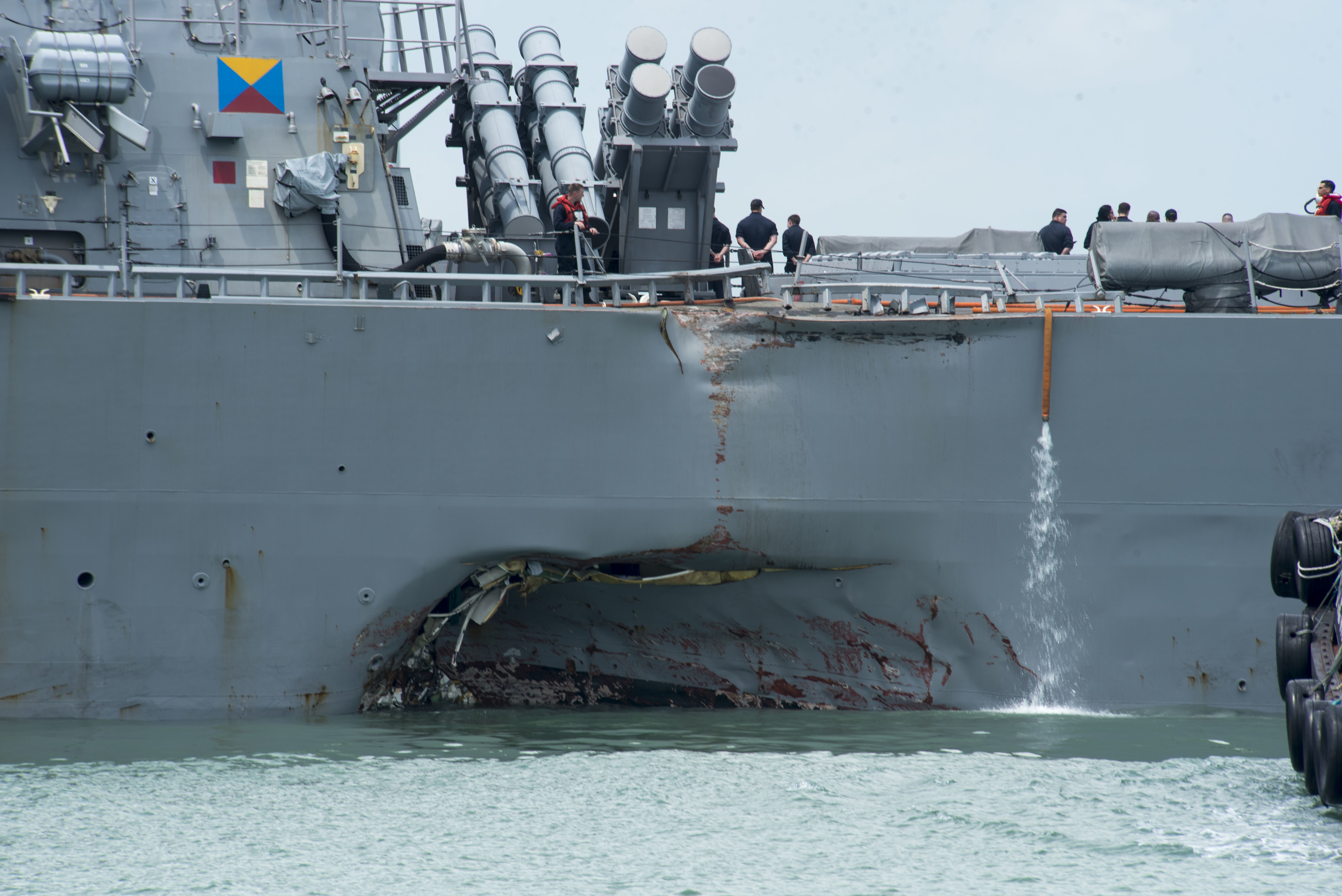Human error or navigation hacking? Outside experts disagree on cause of repeated U.S. Navy collisions.


A free daily email with the biggest news stories of the day – and the best features from TheWeek.com
You are now subscribed
Your newsletter sign-up was successful
On Monday, the U.S. Navy announced that divers had recovered the remains of all 10 sailors killed when the USS John S. McCain collided with an oil tanker in the Strait of Malacca, near Singapore, last week. The crash was the second such deadly incident this summer for the U.S. Seventh Fleet, based in Japan, and the fourth accident since January. Right after last week's collision, the Navy relieved Vice Adm. Joseph Aucoin of command of the Seventh Fleet, a rare punishment for a three-star admiral. But the Navy is still unsure why two high-tech Navy destroyers got blindsided by giant, slow-moving cargo ships, or whether the incidents are connected. There are several preliminary theories.
The first is human error, fed by a grueling schedule for junior officers that leaves little time for sleep plus a lack of training, exacerbated by a shrinking naval fleet asked to perform the same duties as before, The New York Times reports. These systemic errors were highlighted in at least two 2015 reports, which led to a change in scheduling on submarines but not ships. The Navy destroyers have multiple redundant radar and other systems to avoid collisions and other mishaps, plus officers with binoculars stationed at all sides of the bridge, but fatigue can still lead to mistakes.
The other theory is that someone is tampering with, or "spoofing," the navigational system, a form of cyberwarfare that misdirects ships while making the computer readouts appear normal. "There's something more than just human error going on because there would have been a lot of humans to be checks and balances," Jeff Stutzman, chief intelligence officer at Wapack Labs and a former Navy information warfare specialist, told McClatchy, suggesting " electronic issues" as the culprit. Admiral John Richardson, the chief of naval operations, tweeted that there's "no indication right now" of "cyber intrusion or sabotage," but the Navy review "will consider all possibilities."
The Week
Escape your echo chamber. Get the facts behind the news, plus analysis from multiple perspectives.

Sign up for The Week's Free Newsletters
From our morning news briefing to a weekly Good News Newsletter, get the best of The Week delivered directly to your inbox.
From our morning news briefing to a weekly Good News Newsletter, get the best of The Week delivered directly to your inbox.
The fear of navigational spoofing was heightened by a June 22 incident in which roughly 20 ships in the eastern Black Sea found that their GPS signals indicated they were 20 miles inland, next to an airport in Russia, the first confirmed case of GPS spoofing. The Navy doesn't use commercial GPS service, but spoofing of commercial ships can now be accomplished by off-the-shelf hardware and readily available software, says Todd E. Humphreys, a satellite navigation expert at the University of Texas.
A free daily email with the biggest news stories of the day – and the best features from TheWeek.com
Peter has worked as a news and culture writer and editor at The Week since the site's launch in 2008. He covers politics, world affairs, religion and cultural currents. His journalism career began as a copy editor at a financial newswire and has included editorial positions at The New York Times Magazine, Facts on File, and Oregon State University.
-
 How the FCC’s ‘equal time’ rule works
How the FCC’s ‘equal time’ rule worksIn the Spotlight The law is at the heart of the Colbert-CBS conflict
-
 What is the endgame in the DHS shutdown?
What is the endgame in the DHS shutdown?Today’s Big Question Democrats want to rein in ICE’s immigration crackdown
-
 ‘Poor time management isn’t just an inconvenience’
‘Poor time management isn’t just an inconvenience’Instant Opinion Opinion, comment and editorials of the day
-
 British warship repels 'largest Houthi attack to date' in the Red Sea
British warship repels 'largest Houthi attack to date' in the Red SeaSpeed read Western allies warn of military response to Iranian-backed Yemeni rebels if attacks on ships continue
-
 Houthi rebels claim Red Sea ship attacks
Houthi rebels claim Red Sea ship attacksspeed read Iran-backed Yemeni group vows to escalate aggression towards Israel-linked vessels in revenge for Gaza war
-
 Israel plans next phase of Gaza war as first hostages released
Israel plans next phase of Gaza war as first hostages releasedSpeed read After four-day ceasefire 'we will not stop' until destruction of Hamas, says Israel
-
 Mob storms Russian airport 'looking for Jews'
Mob storms Russian airport 'looking for Jews'Speed Read Plane from Israel surrounded by rioters chanting antisemitic slogans after landing in Russia's Dagestan region
-
 Tuberville's military promotions block is upending lives, combat readiness, 3 military branch chiefs say
Tuberville's military promotions block is upending lives, combat readiness, 3 military branch chiefs saySpeed Read
-
 Ukraine's counteroffensive is making incremental gains. Does it matter in the broader war?
Ukraine's counteroffensive is making incremental gains. Does it matter in the broader war?Speed Read
-
 US commissions first-ever Navy ship in a foreign port
US commissions first-ever Navy ship in a foreign portSpeed Read
-
 British spy chief, Wagner video suggest Prigozhin is alive and freely 'floating around'
British spy chief, Wagner video suggest Prigozhin is alive and freely 'floating around'Speed Read
